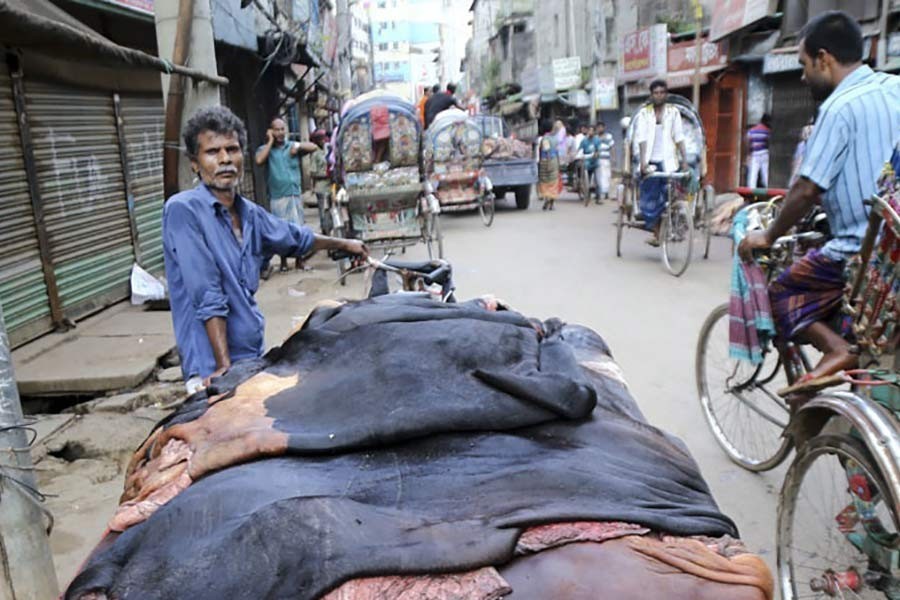
Published :
Updated :

With poor prices raising huge outcry among the rawhide traders during the post Eid-ul Azha period, the tanners have started sourcing the basic raw materials of leather goods from the city's wholesale market. Like the last season, according to reports, the wholesalers cited liquidity crunch and continuous price fall in the global market because of the Covid-19 pandemic as the reasons for lower price offered to seasonal traders.
Although the volume of purchase by the tanners is yet to gain momentum, merchants expect the pace to accelerate from this week and it will continue for three months. Seasonal traders brought salted cowhides and goat skins in trucks and vans from various parts of the country to Posta, the city's wholesale market. But they were frustrated over the selling rates, which were much lower than what they were expecting.
Most the sellers failed to recover their costs because of the lower price offered by the wholesalers. On an average, the sellers incurred a loss of Tk 200 per rawhide. On the contrary, the president of the Bangladesh Hide and Skin Merchant Association said the price at which raw leather was selling was reasonable. He said most the merchants were in cash shortfall as the tanners had not paid their dues since the past few years. That is why, they failed to offer better prices to the seasonal traders, he added.
On a limited scale, tanners have started buying the basic raw materials of leather goods from the merchants. It is expected that the selling will gain momentum from this week and will continue for next three months. Some tanners say they have started sourcing salted rawhides, despite challenges like stockpile of unsold hides, demand fall in the global market and the pandemic. They don't know how long the sluggishness in the business will persist due to the pandemic.
Some of the wholesalers, according to reports, raised the selling rate, which is higher than the official rate. According to the tanners, this is not a good sign. All should comply with the government rate, which was set by all the stakeholders. Earlier, the tanners agreed to purchase salted rawhide from the hides and skin merchants. According to reports, the tanners don't think that there will be any abnormality in supply situation despite the opportunity of the skin merchants to export their products.
The merchants appear to be ready with some 0.30 million pieces of rawhides of the sacrificial animals this year which are stored in warehouses in and around Posta area of the city.
As per government decision, the skin merchants would be allowed to export their products if they fail to get reasonable price. As such the local skin merchants will have to sell their products to the local tanners. If they fail to sell locally, the government may allow export of the raw hides. Yet the fact remains that it is not that easy to start exporting any product all on a sudden. Adequate preparations have to be taken up with all papers works done and potential buyers have to be contacted in different countries.
This year's price fall of rawhide prompted the government to announce that it might allow its export, if needed. Yet such an announcement failed to prevent rawhide from getting wasted as the seasonal traders who work at the downstream had no facility to preserve the items for export. While tanners are worried over the government' move to allow export of rawhide, a sizable number of hides and skins had already been dumped across the country.
Bangladesh Hide and Skin Merchants Association leaders say that the prices of rawhides plummeted across the country due to cash crisis of traders as their payment for the last year's hides and skins worth huge amount of money remained due in several tanneries. Bangladesh Tanners Association leaders said that the prices of rawhide fell due to the syndicate of hide and skin traders. The syndicate allegedly manipulated the market to gain excessive profit and tanners were not responsible for the price disorder as they always procure the items at the government-set prices from the wholesale traders and not from the seasonal and small-scale traders.
There is no denying that the seasonal traders have incurred a huge loss in rawhide and skin trading as price plunged lower than last year's. Many had to part with their goods at almost throwaway prices.
The grassroots' level skin traders at the union and upazila levels should preserve their purchased rawhide of sacrificial animals maintaining proper systems for a few days so that they could get fair price with beginning of its export soon. Many believe the leather industry will go bust once rawhide export begins as the industry is dependent on the domestic markets for its main raw material - rawhide. The industrial units have been built by spending tens of billions of taka, which can operate for maximum three to four months with rawhide from the domestic markets and keep the factories closed for the rest of the year.
The government, on its part, must take necessary steps to stop smuggling of the rawhides by strengthening its vigil in the bordering districts. Good sense should prevail among all the stakeholders - tanners, skin merchants and finished leather manufacturers. The nation cannot afford to see nearly a billion dollar hide market slip away and controlled by the outside forces.


 For all latest news, follow The Financial Express Google News channel.
For all latest news, follow The Financial Express Google News channel.